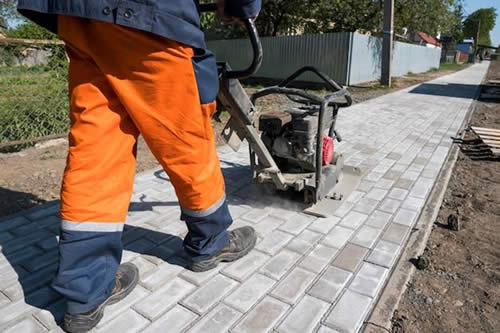If you have oil stains on your pavers, you’re not alone. The amount of oil we have in our lives is much more than what was available to our ancestors. Removing oil stains is almost impossible with regular household cleaners like oven cleaners or bleach. That’s because they are designed to remove other types of stains and won’t work against the hydrocarbon molecules that are naturally present in the oil. However, there are some things you can do to help get rid of the problem once and for all!
Will Bleach Remove Oil from Brick Pavers?

Yes. You can use bleach to remove oil from brick pavers. You will need the following items:
The process is simple and straightforward. You will need a bucket, some bleach, a garden hose or pressure washer, and a soft scrub brush.
- First, fill your bucket with water and add the recommended amount of bleach to it (usually about 1/4 cup per gallon).
- Then, use your garden hose or pressure washer to spray down the pavers from top to bottom, just like you would wash your car. This will help remove any excess oil buildup on your brick pavers.
- Use the soft scrub brush to remove any remaining stains from the surface of your brick pavers using circular motions; this will help prevent additional damage due to over scrubbing, which could cause chipping or scratching on surfaces where paint has been stripped away completely, exposing bare concrete beneath it all together!
Bleach to Remove Oil
You can use bleach to clean oil off brick pavers. To do so, mix one cup of bleach with four gallons of water in a non-metal bucket and stir. Then, using a garden hose or pressure washer, spray down your pavers so they’re completely saturated with the mixture. Leave this mixture on the bricks for 10 minutes before rinsing them off and letting them dry completely.
How much should you use? It depends on how dirty the oil is and how many bricks you need to clean. If all you have are small spots here and there (for example: if someone spilled motor oil on your driveway), then ½ cup per gallon should take care of it easily enough; but if it’s more than that or there’s a large area affected by one spill, then 1 cup per gallon will work better!
How often should I keep doing this? You’ll want to repeat this process at least once every two weeks until all traces of oil are gone from your brick pavers—and even then, it might be good practice if they happen again!
Other Alternatives to Remove Oil
Garden Hose or Power Washer or Pressure Washer
If you’re using a garden hose and soft scrub brush, start by wetting down the pavers with warm water. Then, use the brush to scrub away any dirt or oil buildup on them. Let the bleach sit for about five minutes before rinsing it off with more water and letting it dry completely.
If you’re using a power washer or pressure washer: You can use these methods along with one of those cleaning solutions mentioned above (if they’re safe for brick pavers). Follow all directions on the bottle carefully so that you don’t cause damage to your pavers!
Soft Scrub Brush
If you’re looking for a way to remove oil from brick pavers, bleach may be your answer. There are several different ways you can use bleach to clean your brick pavers. You can use a soft scrub brush, garden hose, power washer or pressure washer in combination with bleach to get the job done.
First, mix equal parts water and bleach together in a bucket or large bowl until it’s completely mixed. Spray the mixture onto the brick paver using a garden hose or power washer/pressure washer until all oil residue has been removed from both sides of each brick paver.
Conclusion
Once you’ve cleaned the area, it is important to let it dry before driving over the pavers. This will ensure that no residual bleach remains on the surface of your brick pavers and that they remain clean for as long as possible! If you have any questions about removing oil stains from your bricks, feel free to contact us today!



